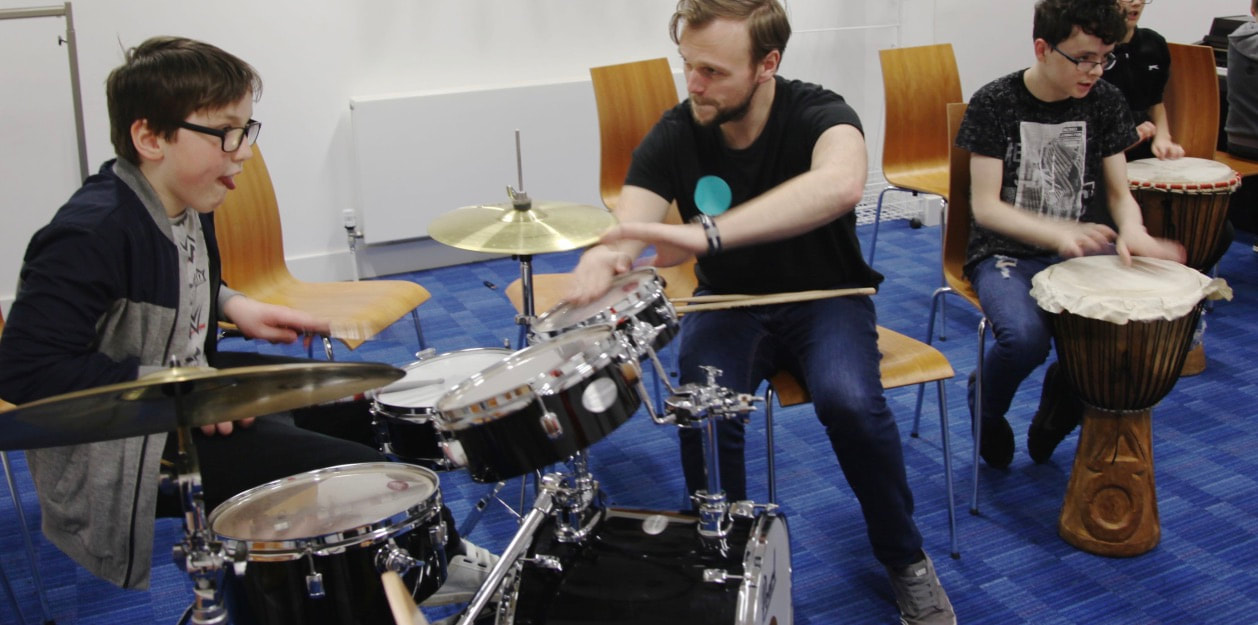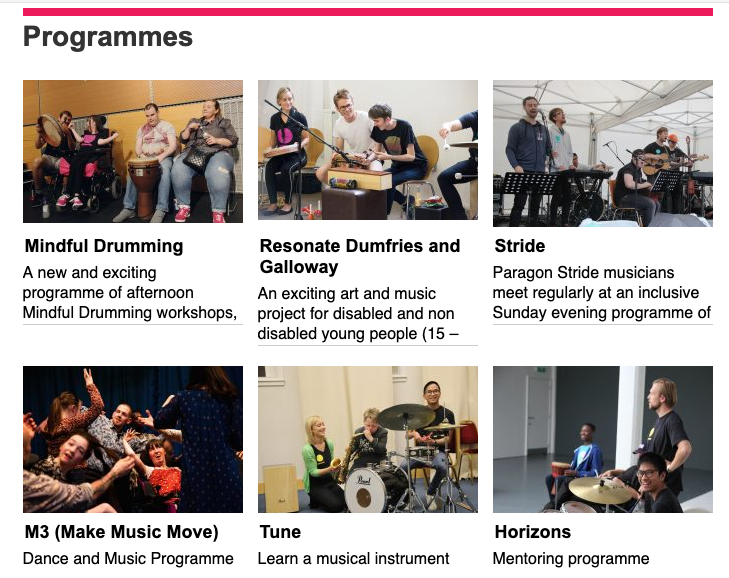In my search for best practices in the areas of creativity and inclusion, I was fortunate enough to connect with Paragon Music, an organization whose mission is to use "music and the arts to raise peopleʼs aspirations, promoting positive self-image, teamwork, communication and learning." Little did I know that when I sat down with the dynamic team of this inspiring organization that they would spark a paradigm shift in my thinking about inclusive education. Instead of starting with a prescribed curriculum or repertoire in which young people who receive additional support needs must find ways to "fit in" by adjusting instrumentation or physical/cognitive complexity, Paragon Music always centers on the student by drawing out the interests, ideas and assets of each ensemble member to create original compositions. Here is a video that beautifully conveys the spirit, philosophy and teaching approaches of Paragon Music.
Creative contribution from all participants forms the foundation of Paragonʼs inclusive pedagogy, which is very different from inclusive practice. According to McIntyre (2009), inclusive pedagogy is "a collaborative approach to teaching based on the idea that all children can learn together, and that participation in learning requires responses to individual differences among learners that do not depend on ability labeling or group, or the withdrawal of the learner for additional classroom support" (p. 603). Dr. Lio Moscardini who serves on the board of Paragon, is a lecturer at the Royal Conservatoire of Scotland in Learning and Teaching in the Performing Arts and is internationally recognized for his work in inclusive education, kindly shared with me the important distinction between inclusive practice and inclusive pedagogy in the music classroom:
While in Glasgow, I was able to volunteer for Paragonʼs Tune, which meets on Saturday afternoons and provides young people (6-16) with additional support needs opportunities to learn an instrument and create and perform music as an ensemble. It was here that I witnessed inclusive pedagogy in action. Every session begins with a community circle and creative warm-up followed by the ritualistic ending of "We Will Rock You." If a child is reluctant to join the circle, staff find ways to include them in purposeful and meaningful ways. For example, one young boy who preferred to walk the periphery of of the room, gladly accepted the job of signaling the start and end of the community circle by playing the triangle. No matter where he was in the room, this boy was keenly aware of the groupʼs activities and didnʼt miss his cue from the music instructor to ring the triangle.
Students then moved into their first 45-minute session of either individual or group work. I was interested to learn more about the creative composition process for ensembles, so I focused most of my observations on these sessions. What I saw was creativity in all of its forms: teaching practice, process and performance. It is no wonder that Paragon won the 2015 Royal Bank of Scotland Community Project of the Year: Finding Scotland’s Real Heroes, which recognizes projects across Scotland that make a huge difference to the communities they serve. This video gives a snapshot of Paragonʼs Tune program:
Students then moved into their first 45-minute session of either individual or group work. I was interested to learn more about the creative composition process for ensembles, so I focused most of my observations on these sessions. What I saw was creativity in all of its forms: teaching practice, process and performance. It is no wonder that Paragon won the 2015 Royal Bank of Scotland Community Project of the Year: Finding Scotland’s Real Heroes, which recognizes projects across Scotland that make a huge difference to the communities they serve. This video gives a snapshot of Paragonʼs Tune program:
Here are some observations from my first visit:
- The music facilitator began the group session by asking everyone, "How was your week?" One boy quickly shared that his birthday was last week. Another child immediately exclaimed that her birthday was coming up this week. From these two excited responses, the facilitator asked the group if theyʼd like to create a composition about birthdays: the answer was a resounding, "Yes!" The instructor dug a little deeper: "What do you like about birthdays? What memories do you have?" She wrote their answers down on chart paper and began creating rhythms and ostinati from them (i.e. "Chocolate, chocolate, chocolate cake" or "Spending time with friends"). At every point in the process, the students played a role in the decision-making process. The music facilitator skillfully noticed what students shared unconsciously - favorite registers on the keyboard, mastered chords on the guitar or love of loud percussive sounds - and helped weave these into the composition.
- Ninian Perry, Creative Director of Paragon Music, also helped lead the session, but his time was spent on the sidelines, encouraging a young person to participate who was not quite ready to join the group. His humor and ability to connect quickly with people ensured that this reluctant musicianʼs ideas and words were included in the Birthday composition from afar.
- After snack, I joined a drum session where favorite drinks were the inspiration behind drum rhythms: "Fanta and Coca Cola." Before the day ended, everyone gathered together for an informal sharing, where individuals and/or ensembles were encouraged to share their work. A particularly inspiring moment was watching a young girl proudly sing a song that she had composed about what itʼs like to be autistic. She had also shared this song at her school talent show.
The social impact that Paragonʼs Tune program is evident in just a 2-hour visit. What I witnessed was validated by a social impact report prepared by the Social Value Lab in 2014. The evaluator noted these impacts while observing Paragonʼs Tune program:
This last bullet point is an important one: when focus is placed on a musicianʼs ability, rather than disability, the experience is asset-building and can be transformative for both teacher and student. Paragon removes labels, challenges assumptions and preconceptions and collaboratively works alongside young musicians to provide "expertly timed opportunistic interventions to catch the moment for participants where cognitive skill, creative skills, communication skills, self-presentation skills could be taken a step forward" (Social Value Lab, 2014, p. 8). With labels removed and opportunities increased, Paragon opens its participants to the process of "positive signification" or "resignification" (Mullen & Deane, 2018).
Paragon Music is a gift to the Glasgow community and a forward-thinking model in the fields of music education, creativity and inclusion. They offer a host of different programs in music and dance for all walks of life with a wide range of additional support needs. Thank you, Nin, Charlotte, Lio, Fiona and the rest of this dedicated Paragon Music staff for welcoming me as a volunteer for Play-On and for providing inspiring teaching practices and experiences in inclusive pedagogy and creativity to take back to Juneau with me!
- learning how to play an instrument
- building confidence
- learning to focus
- happier and healthier (playing and listening to music made participants feel calmer)
- making friends
- brighter future (Paragon challenged assumptions and preconceptions that students and their families may have)
- better family life: parents reported their children being calmer, more positive, communicative and happier at home)
- raised ambitions
- focus on ability as a musician
This last bullet point is an important one: when focus is placed on a musicianʼs ability, rather than disability, the experience is asset-building and can be transformative for both teacher and student. Paragon removes labels, challenges assumptions and preconceptions and collaboratively works alongside young musicians to provide "expertly timed opportunistic interventions to catch the moment for participants where cognitive skill, creative skills, communication skills, self-presentation skills could be taken a step forward" (Social Value Lab, 2014, p. 8). With labels removed and opportunities increased, Paragon opens its participants to the process of "positive signification" or "resignification" (Mullen & Deane, 2018).
Paragon Music is a gift to the Glasgow community and a forward-thinking model in the fields of music education, creativity and inclusion. They offer a host of different programs in music and dance for all walks of life with a wide range of additional support needs. Thank you, Nin, Charlotte, Lio, Fiona and the rest of this dedicated Paragon Music staff for welcoming me as a volunteer for Play-On and for providing inspiring teaching practices and experiences in inclusive pedagogy and creativity to take back to Juneau with me!
References
McIntyre, D. (2009). The difficulties of inclusive pedagogy for initial teacher education and some thoughts on the way forward. Teaching and Teacher Education,25, 602e608.
Mullen, P., & Deane, K. (2018). Strategic working with children and young people in challenging circumstances. The Oxford Handbook of Community Music, 177
Social Value Lab (2014). Social impact of the Paragon programmes: Report for Paragon.
McIntyre, D. (2009). The difficulties of inclusive pedagogy for initial teacher education and some thoughts on the way forward. Teaching and Teacher Education,25, 602e608.
Mullen, P., & Deane, K. (2018). Strategic working with children and young people in challenging circumstances. The Oxford Handbook of Community Music, 177
Social Value Lab (2014). Social impact of the Paragon programmes: Report for Paragon.


